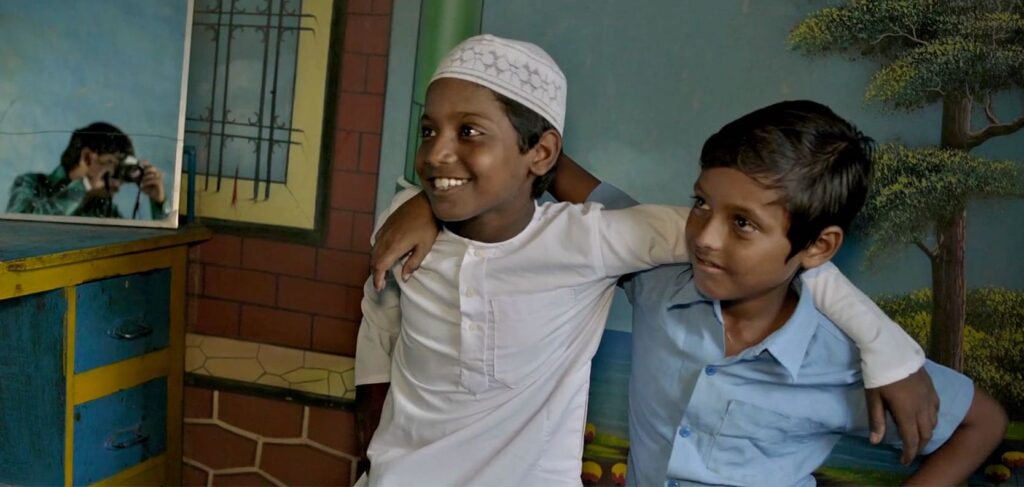Dostojee (Two Friends), directed by Prasun Chatterjee, finally releases selectively in cinemas across India today after a successful run on the festival circuit where it has met with much critical acclaim. Chatterjee’s directorial debut, the film tells us the story of Palash (Asik Shaikh) and Safikul (Arif Shaikh), two friends – one a Hindu and the other a Muslim – who must maneuver the challenging terrain of their friendship in a village in rural Bengal where religious tensions are dangerously simmering below the surface. The result is a sensitive, heartwarming and poetic film that takes one in completely and even as it engages us, it also leaves us devastated and with plenty of food for thought about the volatile situation in India today.
Set in the early 1990s. Palash and Safikul are studying in the same class at their school in the village. They endearingly call each other Dostojee. Palash’s father is a Hindu priest and Safikul’s father is a Muslim weaver. Neighbors, their houses are separated by a thatch fence. Both Palash and Safikul take private tuitions together at the former’s home. It is during this period that the Babri Masjid is brought down leading to the two communities living in the village now affected by religious strife. The belligerence of the opposing religious camps, however, has no impact on the friendship between the two friends. When they aren’t in school, they enjoy themselves by flying kites, playing football, and looking through the bioscope at their local fair, among others. One day, Safikul steals a coin from his older sister’s piggy bank to buy a kite. Palash accidentally damages the kite’s spar while assisting his friend in launching the kite and Safikul shoves him to the ground, out of anger. Following this tiff, they stop talking to one another. Palash, who struggles with his guilt, saves enough money to get his friend a kite. They both pick up their friendship from where they left off. Tragically, a mishap occurs one evening and drastically upends the lives of these friends forever…
In Dostojee, Chatterjee speaks out strongly against the religious divide that takes place between the Hindus and Muslims in the village. In contrast to the Muslims, who intend to erect a scaled-down version of the Babri Masjid in the village, the Hindus, who are a minority, want to construct a temple instead. He highlights the absurdity of the situation when the two friends steal a sack full of sand from a heap that is to be used for building the mosque. This sand is then used for decoration in ‘Janmashtami’, a Hindu festival celebrating the birth of Lord Krishna. By doing so, Chatterjee subtlety addresses the delicate matter of communal rift making its way into the village’s turbulent social dynamics. This, rather solidly and effectively through the perspective of two youngsters, who are blissfully ignorant about the ensuing lack of religious harmony in their respective homes. Although the film does not romanticize Hindu-Muslim harmony, it does highlight the tragedy of fragmentation brought on by radical views. The film thus achingly comments on India’s current socio-political climate.
The second half of Dostojee is shorn of all the childhood exuberance of the first half. It is here that the film truly shines in several moments that lay bare the reality of how we relate to one another in the absence of our loved ones. The scene, where the larval insect, preserved and fed by the two friends in a glass jar, metamorphoses into a butterfly, resonates with such intensity that it forms a lump in our throat. A photograph of both friends in Amitabh Bachchan’s signature pose from Deewaar (1975) serves as a medium for releasing the bottled-up emotions of a grieving mother. Such attention to subtleties empowers the film with moments that are intimate in scope. They spontaneously immerse us into the plight of the characters and their ungovernable situations. Consequently, Dostojee becomes a fine study of human behavior engulfed in distress and explores how it employs its coping mechanisms for survival.
Asik Shaikh and Arif Shaikh beautifully bring innocence, playfulness and ingenuity to their characters with remarkably unaffected
Dostojee is filled with beautifully composed, deep focus images excellently captured by debutant cinematographer, Tuhin Biswas. The crystalline details of the wide river banks, the long stretch of unmetalled road lined with trees and bushes on either side, the mighty river or the interiors illuminated with lanterns at night – all add pleasing visual dynamics to the film. The languid pace and rhythm of life in rural Bengal is created by various unhurried sequences that are timed and managed to perfection by the editor duo Santanu Mukherjee and Sujay Datta Ray. The sound design of the film strikes an even balance between the quieter moments and the unadulterated sounds of nature, thereby adding a rich aural texture to the images
Dostojee proves that sometimes cinema is at its most potent when it is stripped down to the bare essentials and concentrates on portraying the simplicity of existence. The film is piercingly insightful without ever meandering from the core emotional thrust of its story. It has to be said that very few filmmakers have achieved such creative heights with their very first film and for that, Chatterjee must be lauded.
Bengali, Drama, Color


